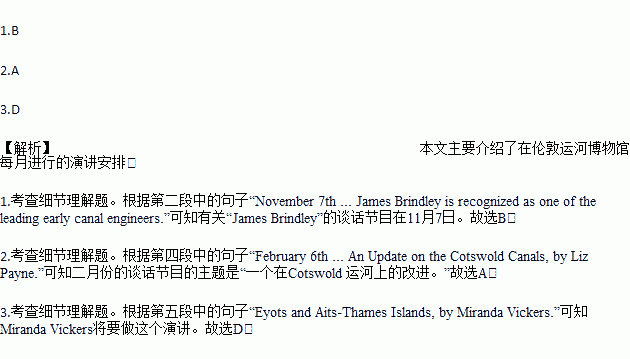题目内容
Monthly Talks at London Canal Museum
Our monthly talks start at 19:30 on the first Thursday of each month except August. Admission is at normal charges and you don’t need to book. They end around 21:00.
November 7th
The Canal Pioneers, by Chris Lewis. James Brindley is recognized as one of the leading early canal(运河) engineers. He was also a major player in training others in the art of canal planning and building. Chris Lewis will explain how Brindley made such a positive contribution to the education of that group of early“civil engineers”.
December 5th
Ice for the Metropolis, by Malcolm Tucker. Well before the arrival of freezers, there was a demand for ice for food preservation and catering(保存和供应),Malcolm will explain the history of importing(进口) natural ice and the technology of building ice wells, and how London’s ice trade grew.
February 6th
An Update on the Cotswold Canals, by Liz Payne. The Stroudwater Canal is moving towards reopening. The Thames and Severn Canal will take a little longer. We will have a report on the present state of play.
March 6th
Eyots and Aits-Thames Islands, by Miranda Vickers. The Thames has many islands. Miranda has undertaken a review of all of them. She will tell us about those of greatest interest.
Online bookings: www.canalmuseum.org.uk/book
More info: www.canalmuseum.org.uk/whatson
London Canal Museum
12-13 New Wharf Road, London NI 9RT
www.canalmuseum.org.uk www.canalmuseum.mobi
Tel:020 7713 0836
1.When is the talk on James Brindley?
A. February 6th. B. November 7th.
C. March 6th. D. December 5th.
2.What is the topic of the talk in February?
A. An Update on the Cotswold Canals. B. Ice for the Metropolis.
C. Eyots and Aits-Thames Islands. D. The Canal Pioneers.
3.Who will give the talk on the islands in the Thames.
A. Liz Payne. B. Malcolm Tucker.
C. Chris Lewis. D. Miranda Vickers.
 应用题作业本系列答案
应用题作业本系列答案

 osed works. Using your fingers to make fine distinctions between objects or textures can reconnect the brain areas involved in touch, suggests Larry Katz, a professor of neurobiology at Duke University Medical Center and author.
osed works. Using your fingers to make fine distinctions between objects or textures can reconnect the brain areas involved in touch, suggests Larry Katz, a professor of neurobiology at Duke University Medical Center and author.